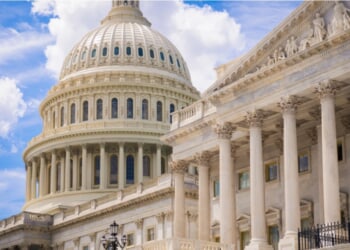You can always tell things are going well when a government starts throwing advisers overboard, as Sir Keir Starmer has been doing in recent months. Just one more top team will fix everything bro, etc.
But it’s particularly baffling to read that the Prime Minister has hired Oli de Botton, “a former teacher who founded an East London free school”, because Downing Street “has been frustrated by criticism of its policy on schools“. Taking nothing away from de Botton, the more logical move would surely be to find another Education Secretary?
It was Bridget Phillipson, after all, who ‘paused’ progress on 44 then-opened new free schools just last autumn, and she who has been driving the Government’s broader education policy, which is more or less to break with a quarter-century of cross-party progress to give the unions what they want.
But we have addressed that at some length a couple of months ago. This morning, we’re talking about pre-school, and the weird state-dependency doom-spiral that is currently playing out there.
Like most ConservativeHome readers, I suspect, I am instinctively sceptical of government efforts to micromanage childhood. I have written elsewhere about the insidious logic of the current requirement for childcare providers to teach an ‘early years curriculum’:
“What’s actually happening here is pretty simple: Labour is proposing to take the next big step towards lowering the de facto school starting age to, well, one. Or just under one. It is doing this by pleading the exigency of a crisis almost entirely inflicted by policymakers.”
Step one: mandate that any childminder except a child’s own parents must teach a prescribed curriculum, and hold the qualifications to do so. Step two: in response to skyrocketing prices, set up nurseries on school grounds, on the basis that they will be cheaper. Step three (as yet hypothetical, but perfectly plausible): restrict state funding to school nurseries rather than ‘luxury’ out-of-school provision.
Of course the early-years requirement is, in part, simply a justification for making illegal informal care arrangements, which might give parents the flexibility not to return to full-time work, which is not what the Treasury wants. A working parent paying for childcare puts two people on the GDP treadmill; a stay-at-home parent none.
It also reflects Britain’s maximalist approach to regulation and inability to calculate cost/benefit tradeoffs. If an early-years curriculum is what the best private nurseries might teach, then every child should get it – regardless of whether or not this is actually practicable. Better to price childcare as a luxury good, and have a chronic baby gap, than countenance ‘lower standards’.
But more awkwardly for small-state types, it might also reflect the shocking reality that many parents just aren’t, well… parenting. Consider today’s story in the Financial Times about the Government’s drive to ensure 75 per cent of children are ‘school ready’ (the current figure is 67 per cent) by the time they start Reception.
Once again, I suspect most readers would instinctively agree with the “almost half of parents surveyed saying they do not view it as their role to prepare their children for school, but for the teacher to develop such skills in the classroom”. After all it’s probably in the same vein as the ‘early years curriculum’, right?
Then you read on to the description of what ‘school ready’ actually means – bear in mind that children in England & Wales start school at five years old:
“As a result, teachers said dealing with these developmental delays can take an average of 2.4 hours away from their traditional teaching day. The charity has since published a list of skills they believe parents need to understand the definition of “school ready”, which includes a child being able to use cutlery, independently use the toilet, recognise their own name and hang a coat on a peg.”
All of a sudden the Government’s decision to introduce mandatory tooth-brushing in primary schools, and all the parents saying it makes their lives easier, is put in some important context, isn’t it?
The launch of the Conservative Party’s ‘renewal programme’, described by Alex Burghart on Tuesday, is a good moment for Conservatives to acknowledge the challenge this poses. What does it means for the politics of personal responsibility if a substantial share of the population simply refuse to take it?
I, for example, have argued that government should simply make a firm decision about what the school age is and scrap attempts to impose education during the ‘early years’ before that point. This seems the only way to sustainably lower childcare costs by reducing barriers to entry and expanding the supply of carers, as well as removing the reason for outlawing flexible payments and informal arrangements of the sort proposed by Miriam Cates (which would, if it matters, be very popular with parents).
But that is focused narrowly on the question of when schooling should begin. It takes as read that the overwhelming majority of parents – rather than merely two-thirds – are doing the job of at least ensuring their children are basically functional.
On the other hand, there is a chicken-and-egg element to this. As James Bartholomew chronicled in his must-read The Welfare State We’re In, the long-term decline in individual responsibility – and its vital corrollary, people’s sense of having agency over their own lives – has gone hand-in-hand with the expansion of the state’s assumption of responsibility.
Once schools start brushing children’s teeth, for example, it is only natural that this comes to be seen as the school’s ‘job’. How long before a future government is first taken to court by angry parents over a child’s fillings?
It is also a recipe for an increasingly expensive and inefficient state at just the point when at least parts of Britain’s governing class are waking up to the fact that we can’t afford one.
The plight of primary school teachers toilet-training their charges, for example, is echoed at the other end of the system by universities having to increasingly teach remedial maths and English to undergraduates; that is, to people whom the state has encouraged to pursue ‘higher education’ and to whom it has sold a £40,000 mortgage to pay for it.
If each level has to fix the shortcomings of the level below it, the costs are enormous, not just in financial terms but also in wasted human time. For almost a century (Elementary Education Act 1880 to Education Act 1972), we schooled people for ten years, from five to 15. Since then we have gradually pushed the de jure upper bound of mandatory education at 18, and through mass tertiary education are increasingly pushing the de facto one up to 21.
Add in the infantilising effects of low wages and a housing crisis, which keeps most young people living in shared accommodation or at home well into their twenties, and the net result over the past 50 years has been shaving a full decade off someone’s adult life without producing a markedly more literate population.
Compare an O Level paper or newspaper from 1972 to an equivalent from 2022, indeed, and if anything quite the reverse.
Yet we continue to lean into it. Neither the collapse of the graduate premium nor the growing number of undergraduates who either should not or simply don’t want to be there has prompted any major rethink in higher education, whilst government continues to flirt with the idea of withholding basic privileges of adulthood (such as carrying passengers in your car) until age 25.
In the end, in the short term, it is simply easier for policymakers to shuffle people into cost-ineffective ‘training’ than admit that people are simply unemployed, and to push ever upward the frontiers of childhood than face up to the fact that we seem to be losing the art of making functioning adults. But such methods, even if effective on their own terms, ultimately compound the problem they seek to palliate.
JS Mill once warned against society “rejecting the stuff of which heroes are made, because it knows not how to make them”. We could apply the same formula here – except for ‘heroes’ substitute ‘adults’, and for “the most passionate love of virtue, and the sternest self-control” (his measure of heroism) substitute “brushing their own children’s teeth”.




![Jasmine Crockett Justifies Mass Illegal Immigration With Bizarre Argument [WATCH]](https://www.right2024.com/wp-content/uploads/2025/03/1742007023_Jasmine-Crockett-Justifies-Mass-Illegal-Immigration-With-Bizarre-Argument-WATCH-350x250.jpg)


![NYC Tourist Helicopter Falls into Hudson River, Siemens Executive and Family Among Those Killed [WATCH]](https://www.right2024.com/wp-content/uploads/2025/04/NYC-Tourist-Helicopter-Falls-into-Hudson-River-Siemens-Executive-and-350x250.jpg)









